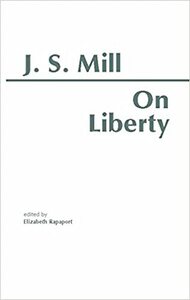You need to sign in or sign up before continuing.
Take a photo of a barcode or cover
challenging
informative
inspiring
reflective
slow-paced
reflective
medium-paced
It is sad state of affairs when our president doesn't quite understand or, even worse, has no respect for the First Amendment. Trump would benefit so much from reading these essays. Instead of spending his working hours watching FOX News, where the biggest debate is whether to call Trump "Great" or "Amazing", he desperately needs to read this.
This was really hard to read over the span of two days for my exam (even tho I read the first two paged like four years ago) - but I really liked it! Millie boi got some good arguments in his pockets and a bit of sass in his sleeve
Phenomenal.
Mill gives a lot of points that apply to us today. Highly recommend
Mill gives a lot of points that apply to us today. Highly recommend
I'm naturally an optimistic realist, so the first two chapters of Mill's argument appealed to me even though he leaves some questions unanswered regarding implementation. The third chapter fascinated me because he continued in his idealism, but when it came to practicality and application, I got bored. I do agree with Mill's politics much more than Carlyle's, but part of that agreement stems from my understanding Mill's writing exponentially more than Carlyle's. Mill is a much easier read!
‘On Liberty’ by John Stuart Mill is a brilliant break down of why people would surrender their liberty to government control. In the first chapter he outlines the necessity and origins of government and traces its evolution through history to the 19th century.
Often times I found the book brilliant, and other times I found his writing hard to follow. I’m not sure if thought processes were different back then, or if Mill thought on a higher level of competence to me, but I would often get lost in his dizzying sentences that would go on forever.
Despite my occasional inability to comprehend what he was saying, I did pick up on a lot of truly great ideas. He even predicted the debacle that was the Russian Revolution. Worth the read!
Often times I found the book brilliant, and other times I found his writing hard to follow. I’m not sure if thought processes were different back then, or if Mill thought on a higher level of competence to me, but I would often get lost in his dizzying sentences that would go on forever.
Despite my occasional inability to comprehend what he was saying, I did pick up on a lot of truly great ideas. He even predicted the debacle that was the Russian Revolution. Worth the read!
‘On Liberty’ by John Stuart Mill is a brilliant break down of why people would surrender their liberty to government control. In the first chapter he outlines the necessity and origins of government and traces its evolution through history to the 19th century.
Often times I found the book brilliant, and other times I found his writing hard to follow. I’m not sure if thought processes were different back then, or if Mill thought on a higher level of competence to me, but I would often get lost in his dizzying sentences that would go on forever.
Despite my occasional inability to comprehend what he was saying, I did pick up on a lot of truly great ideas. He even predicted the debacle that was the Russian Revolution. Worth the read!
Often times I found the book brilliant, and other times I found his writing hard to follow. I’m not sure if thought processes were different back then, or if Mill thought on a higher level of competence to me, but I would often get lost in his dizzying sentences that would go on forever.
Despite my occasional inability to comprehend what he was saying, I did pick up on a lot of truly great ideas. He even predicted the debacle that was the Russian Revolution. Worth the read!
One moment I had my highlighter scrolling like crazy, and the next I felt bored out of my wits. Worth reading for the importance of Mill's classical liberal / libertarian arguments. I was especially interested in what he had to say about education: the idea that the state, while it should require an education for every child, should not be the supplier of education, though it can be the funder for those who cannot afford an education for their children. This would spare us the political battles about what should be taught in school, increase competition and choice, and limit the power of the government to, not his words precisely, but – make clones. This seems like an early libertarian perspective on education, which could be carried out through a sort of universal voucher system scaled to income. But he makes a better argument for the idea than I think I've heard before - that parents are morally responsible for the education of their children. He does suggest annual testing, however, and we see the mess NCLB has left us in...so I'm not so sure about that. In his plan, however, the parents, and not the public schools (because there wouldn't be any), would be held accountable (fined) and be required to see that the children secured a decent enough education (privately, though possibly with public funding) to pass the next time. However, the state would still have to determine what was worthy of putting on the test, design the tests (or pay someone to do so), and approve the tests and enforce them...which returns us again to many of the problems of giving power over education to the state. Anyway, his thoughts on education most intrigued me, because that is a particular, current area of interest for me. There were many more points I highlighted, and I may return to ruminate on them.




